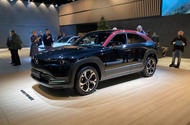Mazda revived the rotary engine in the new MX-30 (pictured), who pairs one with a battery and electric motor to boost range
Mazda still wants to make a rotary sports car, but says such a car is a long way from production
Mazda still wants to make a rotary sports car, but such a model remains a long way from production.
Rotary technology returns to Mazda with a plug-in hybrid version of the Mazda MX-30 R-EV. The tech is scalable and able to be used on other applications beyond its 830cc single-rotor application on that car.
“Rotary is our symbol,” said Yoshiaki Noguchi, assistant manager of Mazda’s powertrain development division. “It’s a dream of engineers at Mazda to have a sports car with rotary. Now is not the time for that.
“When the company situation is a lot better [in regards to completing its roll-out of electrified models], we can think about that dream another time.”
Wakako Uefuji, Mazda program manager, product division, added: “We need to keep the electrification of models for this era. This is the first thing we do but maybe in the future.”
Her quote illustrates the product roll-out for Mazda: its first focus is to electrify its core range, of which rotary hybrid plays a part, but it is not ruling out sports car applications in the future.
It’s now 11 years since the Mazda RX-8, Mazda’s last rotary-powered sports car, went out of production. It raised hopes of a return of the technology with the Mazda RX-Vision concept car in 2015, but it’s on a small crossover where rotary has made its comeback.
Mazda has made huge improvements to the rotary engine since it was last used, improving efficiency and reliability.
“There are three big challenges with rotary,” said Noguchi. “The economy is number one. At the same time, you need to make it lighter to improve the range. Then improve reliability.”
Mazda now uses direct injection rather than port injection, which improves economy by as much as 25%. This in turn reduces CO2 emissions, while rotary engines have always been low NOx pollutants.
Aluminium side housings reduce weight by around 15kg alone. A higher compression ratio of 11.9 features, and a change in thickness to the apex seal and a new coating for this improves reliability.
Noguchi said that the new rotary engine would still perform well at high engine speeds which makes it well suited for a sports car, though in the MX-30 R-EV it runs between 2450-4500rpm as it is used as a generator for the battery.
Source: Autocar
